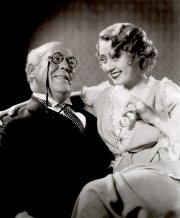Think of this as Volume 12, Number 48 of A-Clue.com, the online newsletter I've written since 1997. Enjoy.

Maybe this will jog your memory. It's a picture of me (the sullen one at the right) taken with my father and brother in 1976.
My dad at that time was 56, close to the age I am now. He was a conservative man, a small businessman. Note the leisure suit. Note the long hair on all of us. My brother, then 13, seemed to be sporting what later came to be known as an "anglo," a sort of white man's afro, a round, curly confection of hair which at the time, I believe, was a sort of dirty blond.
We were dressed this way because that was what culture dictated at the time. This was after 8 years of Republican political dominance, which would be interrupted only briefly by Watergate and the Carter Administration.
America's politics began moving solidly to the right in the late 1960s, and continued moving to the right through the George W. Bush Administration. The turn has just now come, and it's tentative.

Or go back another 40 years. All the cultural touchstones of the "Ragtime" era were in direct opposition to what was really going on. The long dresses, the foppish hats, the attraction of opera, all were in opposition to the growing urban restiveness and populist rage of the time.
Sure the Populists lost. They were hammered. Yet
William Jennings Bryan remained a very popular figure right up to his death. Mencken's "booboisie" were populist in outlook, sometimes (not always) layered with progressive pretensions.
We're talking culture here, not politics.

of the North come to view the South as "the lost cause," noble enough
in spirit to be canonized by "Birth of a Nation" and "Gone with the
Wind," while the culture of the North from that time was consigned to
history's dustbin? This during an era where the South gradually raised again the American flag and the country became more united, north and south?
As a new political thesis arrives on the scene, culture leans against it. In this case, culture becomes more conservative. And you can see that in popular views on social issues, which have (surprise) become slightly more conservative.
Culture leans against politics. Culture is, by its nature, counter-cultural.
This is a story the news media does not see, because the media is embedded so deeply in the culture. They see the culture change and think, "ah ha, people love those teabaggers," "they love Palin, "they hate the Democrats."
That's nostalgia, people. That's an extreme reaction to what is, in fact, a wrenching, long lasting change in the direction of our politics.
There is a reason for this. First, when your side is politically dominant you get busy in other ways, in cultural ways. Second, when your side is politically weak you seek a safe place in which to express your disaffection, and culture fills the bill. Third, there is always a sort of buyer's remorse at work in politics. It's how we keep change in the other direction always at the ready, even when we know we're going down a different path.
This is especially true in the years shortly after a Thesis takes hold. Affinity for a contrasting culture becomes extreme. But if the new Thesis succeeds, this abates, and what abides are some identifying markers, remnants that remain long after the people who use them move back into the dominant culture.
Listen to Kid Charlemagne, released by Steely Dan in 1976:
Now your patrons have all left you in the red
Your low rent friends are dead
This life can be very strange
All those day-glo freaks who used to paint their face
They've joined the human race, some things will never change
What happens, what always happens, is you start with extremism, an extreme reaction to the new politics. You then move through time toward mere affectation. Those who identify with extremism are slowly marginalized. Real, lasting political power lies in this power to marginalize.

But let's not forget the political lesson, either.
Those who identify most closely with the initial, extreme culture of opposition become politically forgotten and, in time, anathema. Clement Vallandigham, Thomas E. Watson, Father Coughlin, Ramsey Clark.
Sarah Palin.











– I remember the music being so much better in my youth!
– ’76 was also the year that Jobs and Wozniak started their thing.
– I remember Ronald Reagan coming to my hometown to make a speech and I was completely unimpressed. (Still am.)
– Awesome baseball decade between the Oakland A’s and Cincy Reds.
However, most of the members of the media have never experienced the culture of the US. For the most part, they’re young, poorly educated, lack any sense of diction. If they are old enough to remember, such as a wacko like Chris Matthews, much of the same criticism applies, since guys like him “misremember” and weight events that were not significant outside the beltway or upper east coast. Hey, but they are consistently conservative, pretty, have lots of hair, and can talk REALLY LOUD.
– I remember the music being so much better in my youth!
– ’76 was also the year that Jobs and Wozniak started their thing.
– I remember Ronald Reagan coming to my hometown to make a speech and I was completely unimpressed. (Still am.)
– Awesome baseball decade between the Oakland A’s and Cincy Reds.
However, most of the members of the media have never experienced the culture of the US. For the most part, they’re young, poorly educated, lack any sense of diction. If they are old enough to remember, such as a wacko like Chris Matthews, much of the same criticism applies, since guys like him “misremember” and weight events that were not significant outside the beltway or upper east coast. Hey, but they are consistently conservative, pretty, have lots of hair, and can talk REALLY LOUD.
That's the way it always is, although most cultural historians don't account for that.
They assume that things are perceived as they were. No. They're perceived as they're perceived. And if that's done incorrectly — if we lie to ourselves about the past — then the cultural interpretation is we believe lies.
We do that a lot. Remember "Birth of a Nation." Remember westerns? Remember those WWII movies from the 1960s that were won by 40-something men?
Dana
That's the way it always is, although most cultural historians don't account for that.
They assume that things are perceived as they were. No. They're perceived as they're perceived. And if that's done incorrectly — if we lie to ourselves about the past — then the cultural interpretation is we believe lies.
We do that a lot. Remember "Birth of a Nation." Remember westerns? Remember those WWII movies from the 1960s that were won by 40-something men?
Dana
Great point, Dana. Such glorification led to the lionization of Reagan, who for many, remains an icon to this day. His handlers merely understood the medium better than his opponents.
Great point, Dana. Such glorification led to the lionization of Reagan, who for many, remains an icon to this day. His handlers merely understood the medium better than his opponents.
Zaine:
Historically, Ronald Reagan gave validation to the Nixon Thesis of Conflict. He made those themes accepted wisdom for the majority of the people, making Democrats the "minority" party for nearly a generation.
The validation of a Thesis is an important historical event. It sets the course of politics for a long, long time. But it always leads to excess, an absolute belief in the truth of the Thesis that turns a set of principles into an ideology and leads to "solutions" to problems that have no relation to reality.
This is what happened to George W. Bush. But it also happened to Lyndon Johnson, who based his program on New Deal values. And on Herbert Hoover, who based his refusal to deal with the Depression on Progressive values. And on Grover Cleveland, whose 1895 sell-out to JP Morgan broke his party in two. And to James Buchanan, the Jacksonian Democrat who dithered in the run-up to the Civil War.
These are cycles for which American history, as yet, offers no cure. Except the creation of a new Thesis. In this case the Internet Thesis of Consensus, what I have lately called the Obama Thesis.
It is always hard to put such theories into practice, because they run into long-held assumptions that won't respond to evidence or argument.
Dana
Zaine:
Historically, Ronald Reagan gave validation to the Nixon Thesis of Conflict. He made those themes accepted wisdom for the majority of the people, making Democrats the "minority" party for nearly a generation.
The validation of a Thesis is an important historical event. It sets the course of politics for a long, long time. But it always leads to excess, an absolute belief in the truth of the Thesis that turns a set of principles into an ideology and leads to "solutions" to problems that have no relation to reality.
This is what happened to George W. Bush. But it also happened to Lyndon Johnson, who based his program on New Deal values. And on Herbert Hoover, who based his refusal to deal with the Depression on Progressive values. And on Grover Cleveland, whose 1895 sell-out to JP Morgan broke his party in two. And to James Buchanan, the Jacksonian Democrat who dithered in the run-up to the Civil War.
These are cycles for which American history, as yet, offers no cure. Except the creation of a new Thesis. In this case the Internet Thesis of Consensus, what I have lately called the Obama Thesis.
It is always hard to put such theories into practice, because they run into long-held assumptions that won't respond to evidence or argument.
Dana